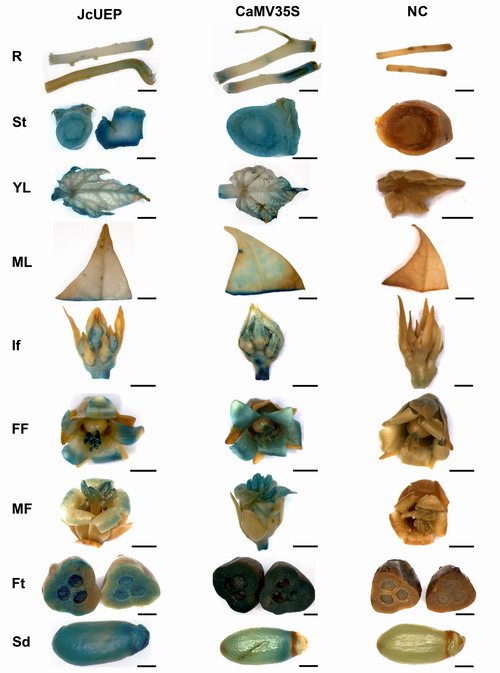
Jatropha curcas is a biofuel feedstock with great potential for production of bio-diesel and bio-jet fuel. However, its low genetic diversity hinders it from making improvements by traditional breeding.
Genetic engineering offers a feasible breeding strategy for Jatropha. The promoter plays an important role in plant genetic engineering as it initiates gene transcription and regulates gene expression temporally and spatially. Therefore, characterization of various promoters in Jatropha, including constitutive, tissue-specific or inducible promoters, is necessary for transgenic breeding.
To find new effective promoters, Prof. XU Zengfu’s team of Xishuangbanna Tropical Botanical Garden (XTBG) of Chinese Academy of Sciences isolated the Jatropha ubiquitin extension protein gene (JcUEP) promoter from Jatropha and characterized it in Arabidopsis and Jatropha.
The researchers identified an ubiquitin extension protein cDNA from their Jatropha embryo expressed sequence tags (EST) library and designated it JcUEP. Although the expression levels varied among different organs, JcUEP was expressed throughout the life cycle of Jatropha. Based on the expression data, the 1.2-kb JcUEP promoter fragment was isolated from Jatropha by genome walking and was analyzed for putative cis-acting elements. Multiple cis-acting elements conferred constitutive activity on the JcUEP promoter. The JcUEP:GUS was respectively transformed into Arabidopsis and Jatropha to test the promoter activity.
The researchers also compared the activity of the JcUEP promoter with that of the cauliflower mosaic virus 35S (CaMV35S) promoter, a well-characterized constitutive promoter conferring strong transgene expression in dicot species.
The JcUEP promoter was found to be constitutively active in both Arabidopsis and Jatropha. In Jatropha, the JcUEP and CaMV35S promoters showed similar activities in stems, mature leaves and female flowers, while the CaMV35S promoter was more effective than the JcUEP promoter in other tissues, especially young leaves and inflorescences. However, compared with the CaMV35S promoter, the JcUEP promoter-driven β-glucuronidase (GUS) expression varied less among different tissues. In addition, the JcUEP promoter maintained transgene expression in Jatropha under stress conditions.
The researchers regarded the endogenous JcUEP promoter as an attractive alternative to the CaMV35S promoter, a well-characterized and widely used constitutive promoter conferring strong transgene expression in dicot species, for driving constitutive overexpression of transgenes in Jatropha.
The study entitled “Isolation and characterization of an ubiquitin extension protein gene (JcUEP) promoter from Jatropha curcas” has been published on Planta.

Figure: Histochemical GUS staining in transgenic Jatropha (Image by TAO Yanbin)

86-10-68597521 (day)
86-10-68597289 (night)

86-10-68511095 (day)
86-10-68512458 (night)

cas_en@cas.cn

52 Sanlihe Rd., Xicheng District,
Beijing, China (100864)

